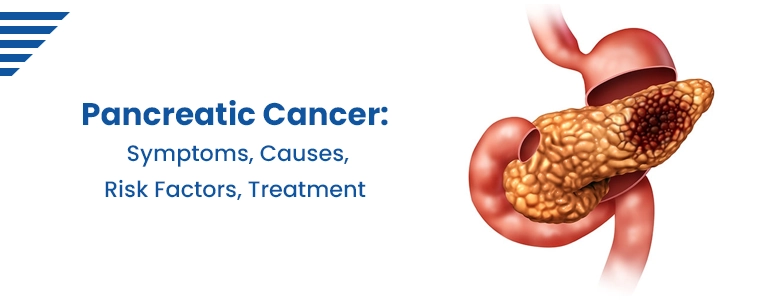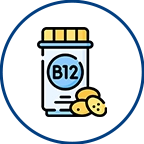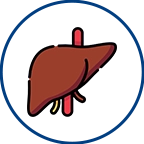Pancreatic Cancer: Symptoms, Causes, Risk Factors, Treatment

Because it often progresses without warning until it is advanced, pancreatic cancer is frequently referred to as a "silent killer". The pancreas, a crucial organ in charge of controlling blood sugar levels and assisting with digestion, is impacted by this aggressive type of cancer. In order to spread knowledge about this difficult condition, we will examine the signs, causes, risk factors, diagnosis, and available treatments for pancreatic cancer in this blog.
Symptoms
Pancreatic cancer is notorious for its lack of early warning signs. Symptoms may only become noticeable when the disease has already progressed significantly. Common symptoms include:
Abdominal Pain: A persistent, dull ache or pain in the upper abdomen or back is one of the first signs of pancreatic cancer.
Jaundice: Yellowing of the skin and eyes, often accompanied by dark urine and pale stools, may indicate a blocked bile duct, which can occur when the tumor grows near the bile duct.
Unexplained Weight Loss: Rapid, unexplained weight loss is common in pancreatic cancer patients due to the body's inability to digest food properly.
Loss of Appetite: A sudden loss of appetite, nausea, and vomiting may be experienced.
Digestive Problems: Pancreatic cancer can cause digestive issues such as diarrhea, oily stools, and difficulty digesting fatty foods.
New-Onset Diabetes: In some cases, the development of diabetes with no prior history can be linked to pancreatic cancer.
Home Sample Collection
Causes
The exact causes of pancreatic cancer are not fully understood, but several factors are believed to contribute to its development:
Age: The majority of occurrences of pancreatic cancer occur in those over 60, and the chance of having it rises with age.
Smoking: One of the most significant risk factors for pancreatic cancer is smoking, which double to triples the risk.
Family History: A family history of pancreatic cancer or certain genetic mutations can raise an individual's risk.
Chronic Pancreatitis: Long-term inflammation of the pancreas can increase the risk of cancer.
Diabetes: Individuals with long-standing diabetes are at a higher risk of developing pancreatic cancer.
Risk Factors
Several risk factors can increase the likelihood of developing pancreatic cancer:
Tobacco Use: The risk is considerably increased by using smokeless tobacco products and by smoking.
Obesity: Obesity or being overweight raises the possibility of getting pancreatic cancer.
Diet: The risk may be increased by a diet that is high in red meat and low in fruits and vegetables.
Occupational Exposure: Certain chemicals, such as those found in the metalworking and textile industries, may be linked to an increased risk.
Chronic Pancreatitis: Persistent inflammation of the pancreas can increase the likelihood of cancer development.
Diagnosis
Diagnosing pancreatic cancer typically involves a combination of imaging tests and biopsies:
Imaging Tests: CT scans, MRI, and endoscopic ultrasound are commonly used to visualize the pancreas and identify potential tumors.
Biopsies: A biopsy is essential for confirming the presence of cancer. It can be obtained through endoscopic ultrasound-guided fine-needle aspiration (EUS-FNA) or surgery.
Blood Tests: Elevated levels of certain biomarkers, such as CA 19-9, may indicate pancreatic cancer, but these tests are not definitive.
Treatment
The treatment approach for pancreatic cancer depends on the stage of the disease and the patient's overall health:
Surgery: If the cancer is limited and the patient is in good health, surgical removal of the tumor is the recommended treatment. This may involve a Whipple procedure or distal pancreatectomy.
Radiation Therapy: Targeting cancer cells with radiation is an option both during and after surgery.
Chemotherapy: Chemotherapy can be administered to shrink tumors before surgery or to control the spread of cancer in advanced cases.
Targeted Therapy: Some patients may benefit from targeted drugs that specifically attack cancer cells.
Immunotherapy: Emerging research is exploring the potential of immunotherapy in treating pancreatic cancer.
Palliative Care: The goals of palliative treatment for people with advanced pancreatic cancer are to enhance quality of life and control symptoms.
Conclusion
Pancreatic cancer is a formidable adversary that often goes undetected until it reaches advanced stages. Recognizing the symptoms, understanding the risk factors, and seeking medical attention early are crucial for improving the chances of successful treatment. Research into pancreatic cancer continues, offering hope for more effective treatments and early detection methods in the future. In the meantime, raising awareness about this silent killer is essential for early intervention and improved outcomes.
Frequently Asked Questions
1: What are the common symptoms of pancreatic cancer?
Abdominal pain, jaundice (a skin and eye yellowing), unexplained weight loss, appetite loss, digestive issues, and, in certain cases, new-onset diabetes are among the frequent signs of pancreatic cancer.
2: What causes pancreatic cancer?
The exact causes of pancreatic cancer are not fully understood, but several factors contribute to its development. These include age, smoking, family history, chronic pancreatitis, and certain genetic mutations.
3: Are there any risk factors for pancreatic cancer that I should be aware of?
Yes, several risk factors can increase the likelihood of developing pancreatic cancer. These include tobacco use, obesity, a diet high in red meat and low in fruits and vegetables, occupational exposure to certain chemicals, and chronic pancreatitis.
4: Can pancreatic cancer be detected through routine screenings?
Routine screenings for pancreatic cancer are not typically performed because the disease often shows no symptoms until it reaches an advanced stage. However, individuals with a family history of pancreatic cancer or specific genetic mutations may undergo genetic testing and surveillance.
5: How is pancreatic cancer diagnosed?
Imaging tests (such CT scans, MRIs, and endoscopic ultrasounds) are used to see the pancreas and biopsies are used to confirm the presence of malignancy in the diagnosis of pancreatic cancer. Elevated biomarkers linked to pancreatic cancer may also be found via blood tests.
6: What are the treatment options for pancreatic cancer?
The pancreatic cancer patient's overall condition, as well as the disease's stage, determine the course of treatment. To control symptoms, treatment options may include surgery (distal pancreatectomy or Whipple procedure), radiation therapy, chemotherapy, targeted therapy, immunotherapy, and palliative care.
7: Can pancreatic cancer be cured?
The chances of curing pancreatic cancer depend on the stage at which it is diagnosed. Early-stage pancreatic cancer that is amenable to surgery has a better prognosis than advanced-stage cancer. However, pancreatic cancer is often detected late, making it challenging to cure. Treatment aims to extend survival and improve the quality of life.
8: Are there any ongoing research efforts or breakthroughs in pancreatic cancer treatment?
Yes, ongoing research is exploring new treatments and early detection methods for pancreatic cancer. Scientists are investigating immunotherapy, targeted therapy, and precision medicine approaches to improve outcomes. Early detection strategies are also a focus of research to identify pancreatic cancer at more treatable stages.
9: How can I reduce my risk of developing pancreatic cancer?
While some risk factors for pancreatic cancer are not controllable, you can reduce your risk by quitting smoking, maintaining a healthy weight through diet and exercise, limiting alcohol consumption, and managing conditions like diabetes and chronic pancreatitis under medical supervision.
10: Where can I find support and information about pancreatic cancer?
For people and families affected by pancreatic cancer, a number of organizations, including the Pancreatic Cancer Action Network (PanCAN) and the American Cancer Society, offer services, support, and information. You can also consult with healthcare professionals for guidance and support.
Book Your Slot
Our Locations Near You in Hyderabad
3KM from Banjara Hills
1.9KM from Yusufguda
3KM from Madhura Nagar
5KM from Shaikpet
Profiles
- Cardiac Risk Profile
- Pituitary marker Profile
- Rheumatoid Arthritis Profile
- Dengue Fever Panel
- Lung Cancer Panel 1 Complete Molecular
- Gastroenteritis Screening Panel
- Thyroid Profile (T3,T4,TSH), Serum
- Pancreatic Marker Profile
- STD profile
- Androgen Profile
- Lipid Profile, Serum
- Pancreatic(acute)Profile
- PCOD Profile
Radiology
Pathology Tests
- Glucose Fasting (FBS),Sodium Fluoride Plasma
- Creatinine, Serum
- Glycosylated Hemoglobin (HbA1C)
- Vitamin B12 (Cyanocobalamin), Serum
- Thyroid Stimulating Hormone (TSH) Ultrasensitive, Serum
- Complete Urine Examination (CUE), Urine
- Liver Function Test (LFT),Serum
- Dengue (IgG & IgM), Serum
- Dengue Antigen (Ns1) Rapid, Serum
- C-Reactive Protein (CRP), Serum
- Widal (Slide Method), Serum
- Total IgE, Serum




